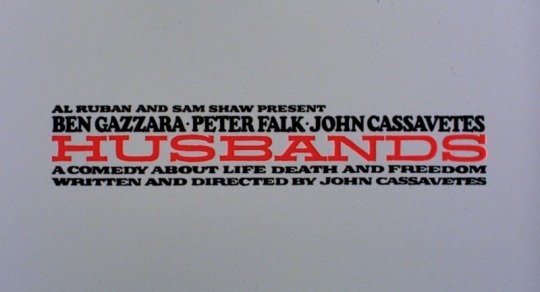Photo
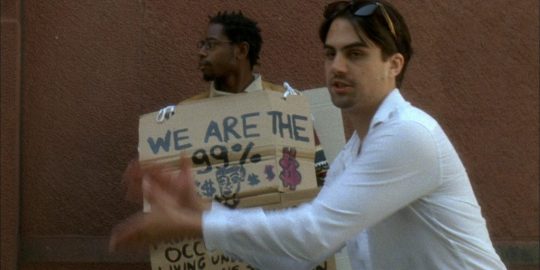
https://www.talkhouse.com/on-the-virtues-of-cinematic-failure/
///
Most journalists who have spoken to me about my new erotic drama PVT Chat (starring Peter Vack and Julia Fox and streaming now on most VOD platforms) assume it’s my first feature film. Actually, it’s my third. My first two features never played a single film festival and haven’t been seen by more than a few hundred people (mostly friends and/or curious followers of my rock band, Bodega). They were financial failures (even though they were made extremely cheaply), but you couldn’t call them critical failures because nobody has ever reviewed them. I spent the last decade working on these films and yet their cultural footprint is practically nonexistent.
Despite that, I still believe in them and hope one day I’ll make a movie (or record) that inspires people to seek them out. My early cinematic attempts certainly failed at behaving like normal movies, but to me it is precisely this failure that makes them interesting.
Godard said of Pierrot le Fou (1965), “It’s not really a film. It’s an attempt at a film.” This is a purposefully cryptic statement, but I think I understand what he meant. There is a sketch-like quality to his films from that period. He was less interested in following a particular plot through to its conclusion than suggesting narrative ideas and moving on. He enjoyed employing classical narrative tropes but didn’t want to waste screen time on the proper pacing required to sell those tropes to an audience. Instead he filled his screen time with spontaneous personal, poetic, and political ruminations that occurred to him literally on the day of filming. Many found – and still find – this approach infuriating, but for a select number of Godard disciples, like me, this type of filmmaking is still revolutionary. I remember seeing Weekend during my sophomore year of college at the University of South Carolina and having my mind completely ripped open. Suddenly the world wasn’t a small, mediocre, predictable place – it was full of music and color and philosophy and eroticism. There were people out there genuinely disgusted with the status quo and boldly proclaiming it with style.
Godard’s work is a fulfillment of the dream of the caméra-stylo – a term coined in 1948 by Alexandre Astruc that argued it was theoretically possible for someone to compose a film with as much direct personal expression as exists in prose. In order to achieve this level of expression, one often needs to move beyond the realm of mere plot and narrative naturalism, the principle that what you are seeing on screen is real. (On most movie sets, the filmmakers and actors work overtime to sell this illusion.) Films that focus solely on plot, character psychology, and one literary theme have to direct the majority of their screen time toward plotting mechanics and emotional manipulation of the audience. What you gain in dramatic catharsis you often lose in intellectual honesty. There’s always a tradeoff. I am invested in a cinema of the future that veers toward self-expression, but doesn’t need to avoid dramatic catharsis as Godard’s films did. Certainly many filmmakers my age are working to achieve such a synthesis of intellectual directness and narrative pleasure. Experimentation is required and many “bad” films need to be made to pave the way for future successes.
I graduated college in 2010 high on this dream of the caméra-stylo and philosophy (my field of study) and in 2011 started filming my first feature, Annunciation, with experimental filmmaker Simon Liu. Annunciation is an “adaptation” of the Mérode Altarpiece, an early Northern Renaissance oil painting triptych by Robert Campin. The film features three short separate narratives, one for each panel of the famous 15th-century painting. I wanted the performances in Annunciation to be controlled and somewhat surreal, as if the whole film existed in a heightened but slowed-down hypnotic state; I was thinking about Bresson, Ozu, Antonioni and, of course, Godard (particularly his work from the ’80s). There is some plot, but the main goal of the movie was to reveal the miracle of existence in the everyday. And because the Mérode Altarpiece depicts the scene in Christianity where the Virgin Mary was impregnated by light alone, the film had to be shot on 16mm film.
Now picture this: a 22-year-old walks into a conference room in Midtown Manhattan and gives this pitch to a producer who was then investing in thriller movies: “Every time light strikes a piece of celluloid, a miracle similar to the Annunciation scene occurs: an image appears in the likeness of man that redeems our fallen world and reveals it to be the beautiful place that we take for granted in our normal day-to-day.” This wasn’t met with the enthusiasm I was hoping for. “Don’t you see,” I said, “this is a film about the ecstatic of the quotidian! This is a film that audiences will flock to! It could do for Williamsburg and Bushwick what Breathless did for Paris!” Looking back, I am both shocked and charmed by my youthful naiveté, courage and idiocy.
I was laughed out of the room, but the producer was kind enough to wish me good luck and welcomed any future pitches, should I come up with something any “normal” person would want to watch. I never thought of films in the tradition of the caméra-stylo as being elite works only for the gallery or the Academy. I, like Godard before me, have always assumed that audiences are intelligent and long for thoughtful, challenging movies. That belief I carry to this day and thankfully it sometimes seems to be true. How else could you explain the recent success of heady films by Josephine Decker or Miranda July?
Thanks to small donations from family members (and credit cards), I was able to shoot Annunciation without any official backing. I cast the film with a mixture of non-actor friends and some undiscovered Backstage.com talent and dove head first into the production. Right as our principal photography began, Occupy Wall Street gained momentum, so Simon and I spent time at Zuccotti Park filming our actors experiencing the movement. The hopeful promise of OWS seemed to reflect the yearning desire of our film’s protagonists as well as our own idealist cinema experiment.
When the film was finished and edited, I naively assumed that we were well on our way towards global cinematic notoriety. Surely, I thought, this important film that manages to blend fiction with actual footage of OWS would premiere at Cannes or Berlin and the Criterion Collection would issue the DVD shortly after. In actuality, it was rejected from every single film festival we submitted to.
Undeterred, I conceded that maybe there were a few minor structural flaws in the edit. It was probably a little too long and perhaps the three separate narratives would work better if they were crosscut more. A year later, this new edit was again rejected from almost 100 festivals. Stubbornly, I thought that perhaps what could really bring the movie together was a comic voiceover by my then cinematic muse Nick Alden (who is a lead in both Annunciation and my second film, The Lion’s Den). Audiences seemed to ignore the comic tone underlying Annunciation. If only I could unearth it, they wouldn’t be put off by the pretensions to greatness the movie wore on its sleeve. There is nothing so offensive to American audiences as pretentiousness.
I didn’t send the overcooked voiceover version to festivals. I knew it was forced and worked against the core concept of the film. But it was then that I started for the first time to have doubts about Annunciation. Maybe my film wasn’t as emotional or clever as I imagined. Maybe it was bad? “No,” I decided. The film, whatever its flaws may be, has value. Herculean delusions of grandeur come in handy when you are trying to become an artist.
I opted to edit the film back to its original state, but without some of the weaker, obviously didactic moments, then hosted a few local screenings in NYC (most of them at DIY venues where my rock band would play) and put the film up for free on Vimeo. Around this time, it occurred to me that editing Annunciation had been my film school. Failure is a wonderful learning tool. Editing the same raw material in a myriad of different ways taught me about pacing and tone. Still to this day, when I find myself in a certain state of mind, I open up the Final Cut sessions and do a new edit of the footage just for fun, like some sort of DIY George Lucas tinkering with the past. Last year during quarantine, I did a new edit of Annunciation and uploaded it to Vimeo without telling a single person. It has become my own little cinematic sandbox to play in.
When people did chance upon one of my myriad edits, they often commented that they enjoyed its style but found the acting too unnatural. My response to this was to make my next film, The Lion’s Den, a cheaper HDV feature that doubled as a political farce and an essay about naturalism in cinema. The film is about a group of ding-dong radicals who kidnap a Wall Street banker and plan to donate his ransom money to UNICEF so salt pills can be provided for dehydrated children. The UNICEF plot was drawn from Living High and Letting Die, a 1996 work of moral philosophy by Peter K. Unger. It was both a serious attempt at political philosophy and a total slapstick farce; I was imagining the comedy of errors in Renoir’s The Rules of the Game mixed with the Marxist agitprop of Godard’s La Chinoise.
The acting style in The Lion’s Den was purposefully cartoonish; at no point in the film could an audience member believe that what they were seeing was real. I like to think that The Lion’s Den was an attempt at theatre for the camera, part Shakespeare and part Brecht. This was my own personal response to our epoch’s hyperrealism fetish. At the time, I believed that the current obsession with neo-neorealism, mumblecore and reality TV was worth combating. Art with a realistic aesthetic, I thought then, was inherently conservative and accepting of the political status quo (whether the artists were aware of this or not). Art with an imaginative anti-realistic aesthetic, so I thought, was utopian. It opened new vistas and ways of thinking and being. It dared to believe in a more beautiful world than the one we are living in.
The making of The Lion’s Den was extremely difficult. It was by far the hardest thing I have physically done in my life. At the time, I was malnourished and broke, not unlike the character of Jack in PVT Chat; my diet for that month we made the film consisted mostly of coffee, rice and beans, ramen, light beer, and the occasional waffle or fruit smoothie from the vegan frozen yogurt stall I worked at. Unlike Jack, my addiction wasn’t cam girls or internet gambling, but independent filmmaking. I begged, borrowed and scrimped $10,000 to make a film I knew I wouldn’t be able to sell. Despite having some key collaborators near the beginning of the shoot, most of the film was made with just me, the actors and a loyal boom operator, all living together in a house in Staten Island. This meant that I had to assemble all of the cumbersome lights for every setup, handle the art for every scene (which involved a lot of painting), block the scene and direct the actors, throw the camera on my shoulder and film, and then at the end of the day transfer the footage while logging the Screen Actors Guild reports and creating the call sheets for the next day’s scenes. Exhausted both mentally and physically, I often couldn’t stand up at the end of the day’s filming.
Once we’d wrapped and everyone had gone home, I stood in the middle of our set and played Beethoven on my headphones. Within seconds, I began bawling my eyes out, partly from exhaustion but also from the melancholy that all my friends had left and I was now alone for the first time in a month. I collapsed and slept for hours. When I woke up, it was my 26th birthday. I celebrated by watching Citizen Kane alone and then started the process of painting the walls back to a neutral white. The actor Kevin Moccia (who has been in all three of my films and actually works as a house painter) heroically came back to set and helped me. I told him that despite all of the agony of the past weeks (my bank account was now in the red, with overdraft fees piling up), I was happier than I had ever been. Working passionately on something that has great value to you is, without a doubt, the key to happiness.
Shortly after returning to the real world and my job at the vegan yogurt shop, I passed out while on the clock and was taken to a hospital by my very supportive girlfriend. Turns out, all I needed was an IV and some nutrients to get back on my feet, but unfortunately the trouble with The Lion’s Den had just begun. At some point, I formatted the production audio memory card and, in one instant, accidentally deleted everything on it. For the next two years, my friend Brian Goodheart and I worked with all of the actors to dub all of the dialogue and sound effects in the movie. Each actor had to completely re-do their verbal performance. It felt like remaking the entire movie. The result made the film especially un-naturalistic (which pleased me at the time) and it turned out far better than I think Brian and I expected.
By then, I had some hopes that The Lion’s Den could reach a small audience. It is aggressively philosophical but also features a love triangle, a car chase and a final shootout. Its comic style, I was hoping, would attract people who were put off by the purposeful flatness of Annunciation. Nevertheless, the movie was also rejected from every conceivable festival. I now realized that submitting an aggressively experimental narrative film without a single famous person in it to festivals is basically like flushing your money down the toilet. Yet I continued submitting, like an addict at a casino putting all of their savings on the roulette table. You never know, right?
In hindsight, I now see The Lion’s Den as a very angry film that perhaps uses comedy to soften the blow of some of its hotheaded fervor, and suspect some of its critique of capitalism and naturalism came from hurt and jealousy. “You think my work isn’t natural enough, eh? I’ll show you motherfuckers naturalism!”
Sometime in 2017, to my surprise I became smitten with certain neo-neorealist filmmakers (Joe Swanberg, in particular) and decided I wanted in on the mumblecore party, albeit from my own outsider perspective. I began to see how I could work symbolically with naturalistic performances, which led me to my latest film. PVT Chat is by no means a work of strict realism, but nevertheless focuses on believable dramatic performances. The film’s cast blends some actors from my past work (Kevin Moccia, Nikki Belfiglio, David White) with some heroes of the modern neo-neorealist indie cinema (Peter Vack, Julia Fox, Buddy Duress, Keith Poulson).
I want to end with a bit of advice to other filmmakers: Don’t put your self-worth into the hands of festival reviewers or distributors. The future of the moving image will belong to the films that are willing to risk cinematic failure. If you make an earnest film that doesn’t behave like a normal movie, I want to see it, even if it is full of technical or narrative mistakes (which it most likely will be). There’s no right way to make a movie. Follow the dream of the caméra-stylo and make a film that if nobody else made, wouldn’t exist.
5 notes
·
View notes
Photo

Will be streaming VOD everywhere February 9th.
2 notes
·
View notes
Photo
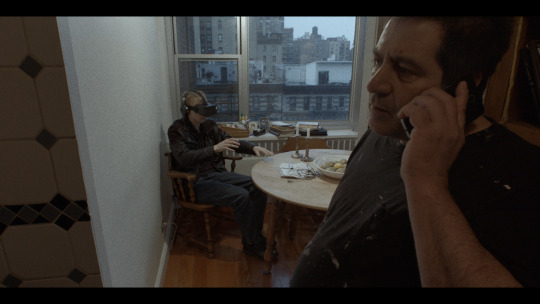
I’ve noticed that some online criticism of PVT CHAT stems from the fact that when the protagonist makes moral mistakes he isn’t punished harshly enough.
This Old Testament-esque desire for fictional revenge strikes me as slightly disturbing. People do realize that when characters make mistakes in drama that doesn’t mean the author approves of their behavior, right? Furthermore, do these people not think that those who have done wrong deserve any kind of redemption?
Q: Is this the influence of STAR WARS black and white morality?
I think many of these online critics mean well or I wouldn’t bother writing this.
I respect the intelligence of film audiences which is why the film doesn’t engage in such black and white moralizing. All good people do bad things and all bad people do good things. Anyone honest knows this. I’ve tried to depict human behavior as honestly as I know it.
///
When Scarlet visits Jack at the motel ---> I wasn’t staging an ironic fantasy fulfillment. At the end Scarlet is attempting to make amends for hurting somebody that she cares about.
Of course their relationship involves a high level of fantasy but why on earth should fantasy be excluded from the movies?!
<3
-ben.
2 notes
·
View notes
Text
Interview from Fandomize w/ Beth Shiller, Keith Poulson, and me for PVT CHAT ///
Beth: I always like to start with the question of how did you get into this industry? What sparked your passion?
Ben: I saw Jean Luc Godard’s Weekend my sophomore year of college and was never the same. The movie felt like philosophy, poetry, painting, music, and so much more. I didn’t realize how personal and expressive filmmaking could be. I made my first serious film high on Godard’s cinema shortly after in 2011 (Annunciation).
Keith: I took kind of a strange route to get here. I was working at a video store (I Luv Video in Austin) around 2005 and my co-worker was an actor, prepping to be in a film. The director of that project would come and run lines with the co-worker. He liked the dynamic that my coworker and I had and eventually decided to put me in the movie too. That’s how I was cast in my first film. I’ve been working somewhat consistently as an actor since then. I feel really lucky that acting came to me. I don’t know that I would have had the courage or commitment to pursue it on my own. I’ve always had a passion for film and filmmaking, but it was a bit of luck that sparked the passion for acting.
Beth: Congrats on PVT Chat’s premiere this weekend! That is so exciting! How do you feel about it?
Ben: Thank you —-> I’m very very excited for people to be able to watch it around the world. It’ll be a great joy to hear and see how people react to the ending. My rock band (BODEGA) is actually finishing up the mix of our new album in the studio this weekend so I’ll be there celebrating the release of a film with the creation of song.
Keith: I think it’s great that people can finally watch it. I do feel a bit sad that I didn’t get the opportunity to watch the film with a theater full of strangers. I think it’d be a fun one to watch with a big crowd. So that’s the only downer to all of this, but in the end I feel good and happy for everybody involved.
Beth: Ben, what inspired this story?
Ben: I was initially drawn to the worlds of cam girls and online gambling because they both seem to really crystallize something essential about this historical moment where most emotion is processed through computer screens. I don’t see the cam or online gambling worlds as that different from social media: they are just different forms of stimulation addiction. In many ways I think the most pressing issue of our time is how consciousness is changing (for better and worse) through our relationship with new technologies. I wanted to make a modern drama about a relationship that developed over the internet; one that showed both the negative and positive aspects of online relationships.
Beth: What was the writing process for this film like?
Ben: I wrote the first draft in 2015 which was much more of a straight genre piece (modern film noir). I kept re-writing and eventually the movie morphed into something more satisfying, alive, comic, and strangely romantic. The relationship of the two main characters became less and less cynical and more sincere as I was writing. In some ways I started to think of the movie as a perverted romantic comedy. Once I met the leads the script changed again to adapt to their personalities.
Beth: Keith, what drew you to this project?
Keith: The director Ben’s energy and the opportunity to play a character dissimilar to other things I’ve done.
Beth: Keith, you play Duke, how would you describe him?
Keith: Ambitious and selfish.
Beth: Keith, do you think Scarlett is still playing Jack at the end or do you think she caught feelings?
Keith: I like a happy ending (in films) so I’ll go with caught feelings. Duke probably thinks she’s setting up the stage for an even bigger con.
Beth: Ben, was it always the intent to leave it open ended?
Ben: It’s open-ended on the level of plot (and I do enjoy hearing people’s interpretations of what they think might happen to Jack and Scarlet) but I wanted the ending to be clear on an emotional level. I wanted the audience to leave with a feeling of lightness, hope, and joy. Despite all of the wrongs that have been done in the movie – in that moment there is genuine release.
Beth: Ben, this is a “romance about freedom, fantasy, death and friendship” can you explain this further?
Ben: This was my personal homage to Cassavetes’s Husbands. That movie has the subheading ‘A comedy about life and death and freedom’ which I love. My film feels similar to HUSBANDS in many ways. They are both about the hollowness of a certain kind of maleness and the yearning for something more authentic.
Beth: What was the filming process like?
Ben: The filming involved a lot of improvisation both with the actors and with the camera. I allowed the actors to change some of the dialogue to suit their voice and I also experimented quite a bit with spontaneous camera movement. I was operating the camera myself so I could improvise my movements as freely as the actors could improvise – when Jack moves through his apartment I could follow him and look around and see what I wanted to see. A lot of this was done instinctually and without much premeditation. There is a moment in the film where the camera glides past Jack on the ground in a bedroom and goes through his window into the dark of the NYC night. That was done completely off the cuff in an improvised manner. I love unmotivated camera moves when you can get away with them. They tend to suggest the metaphysical in a fashion unique to cinema.
Keith: Quick and energetic, the way a lot of independent films have to be. It felt like I had to just jump in, catch up and get spit out. A fun whirlwind of a shoot.
Beth: Ben, I don’t know a lot about cameras and how the angles help tell the story, but I noticed that the camera gets very close to the characters. Was this intentional?
Ben: Absolutely. We shot the whole movie on a very wide angle lens which distorts the image slightly and makes the eye really aware of changes in depth of field. I wanted people to feel like they can reach out and touch the objects in Jack’s room, such as his laptop, or his face.
Beth: Do you have any funny stories from set?
Keith: When I arrived to set for my first day, I showed up to the apartment location and buzzed in. Somebody came down to let me in and immediately let me know that I had just ruined a take. Whoops. (It was smooth sailing after that)
Beth: Do you have other projects coming up?
Ben: I have two scripts that I’d like to film sometime after quarantine but nothing that I can really discuss as of now. My band BODEGA will have a new LP out late summer/early fall this year.
Keith: Nothing specific lined up right now. I filmed a few things last year that will hopefully be shown in festivals and theaters when that sort of thing is more possible. Another film I did “I Blame Society” is currently playing in digital theaters. Mostly I’m just trying to stay warm and stay sane.
#https://www.fandomize.com/featured/pvt-chat-with-writer-director-ben-hozie-and-actor-keith-poulson/
0 notes
Audio
Check out and download PVT TAPE ---> a free digi mix tape built of collage moments from Austin Brown’s score for PVT CHAT.
1 note
·
View note
Photo
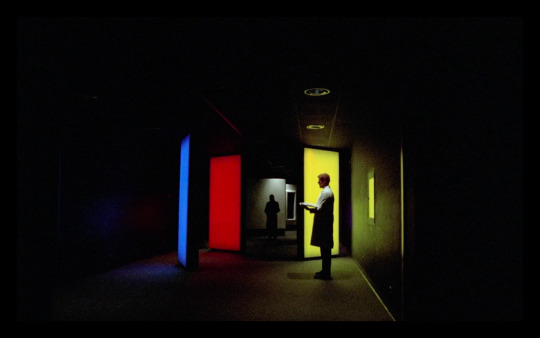
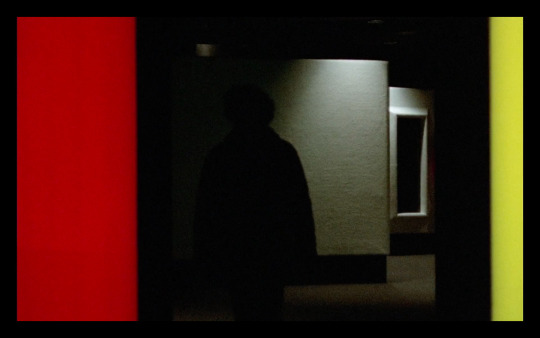



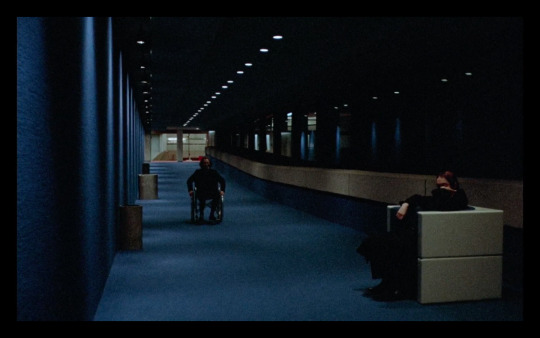
My favorite horror movies tend to take place in one very concrete setting ----> I’m thinking of the abandoned shopping mall in Dawn of the Dead (1978) and the bland yuppie paradise high-rise condo in Shivers (1975).
In Cronenberg’s early Crimes of the Future (1971) there is an Antonioni-esque obsession w/ architecture and color that attracts me just as much as watching the unfolding and discovery of his later ‘body horror’ thematics.
1 note
·
View note
Video
youtube
Love this early Joe Swanberg short ----> it feels like such a period piece now despite its prophetic nature.
0 notes
Photo
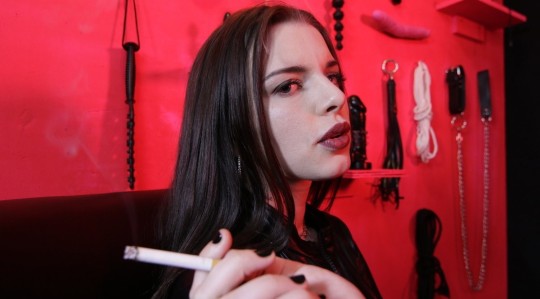
https://consequenceofsound.net/2020/08/fantasia-film-review-pvt-chat/
^^
Lovely early review of PVT CHAT :
‘What could have been an erotic thriller unfolds into a pitch black romantic comedy — one for the kinds of people who traditionally scoff at romantic comedies. It’s a welcome change of pace and the wry, oft-silly, sense of humor is surprisingly pleasant. PVT CHAT is a thoroughly modern romantic comedy exploring isolation and loneliness that is equally inspired by Paul Schraeder’s American Gigolo as it is The Apartment. Hozie and Fox bring an unparalleled sexiness and authenticity to the kink sequences, an especially impressive feat given that the majority of them take place through computer screens. It’s a fantasy with a happy ending, and don’t we all deserve one? Even us perverts?‘
0 notes
Video
vimeo
I recently re-stumbled across this very-2009 looking essay short I made w/ some friends in college. A dialogue in it says something like ‘Films are valued not for their ideas but for the unique presentation of their ideas.’ While of course I still agree w/ my observation that what people most desire at the cinema is experience I don’t think I quite grasped at the time that a specific experience of an idea is itself a type of idea. I acted that way (and you can’t direct without acting on this principle) but I don’t remember ever making the distinction in that way. Regardless, ideas in art matter ---> films are good precisely because of the ideas behind them ----> don’t let a formalist tell you otherwise. :)
1 note
·
View note
Video
youtube
youtube
Two wonderful world-investigating shorts by Charles and Ray Eames.
0 notes
Photo

Interview w/ Ben Hozie and Jesse Locke for Aquarium Drunkard:
Aquarium Drunkard: I know you primarily as a musician, so can you tell me a bit about your background as a filmmaker?
Ben Hozie: I’ve been making DIY films for almost as long as I’ve been writing songs in rock groups. So far the music has connected with more people but I intend to do both for as long as I can. I shot my first feature Annunciation when I was 22 on 16mm w/ experimental filmmaker Simon Liu. At that time I thought we made this really significant work that would skyrocket us into international film notoriety so it was quite humbling when we got rejected from almost every film festival in the world.
I love personal cinema too much to be discouraged so I put my head down and made a few shorts and another feature called The Lion’s Den a few years later on DV cam for about ten thousand dollars. That one was also rejected from all the film festivals so here I am again with another new film. PVT Chat was shot and edited around the last seven or eight BODEGA tours. I’m hoping that one day I will make a film that people really respond to which will dignify and force people to revisit the rest of my movies.
AD: What are your first two films Annunciation and The Lion’s Den about?
Ben Hozie: Annunciation is a modern ‘adaptation’ of the Mérode Altarpiece Triptych (the early northern Renaissance painting) that is composed of three narratives (one for each panel of the painting) : a director of advertisements who falls for his intern, a young tourist struggling to overcome impotence, and an actress portraying the Virgin Mary who decides to become a surrogate mother. The filming coincided with Occupy Wall Street so we filmed scenes at Zuccotti Park and allowed Occupy to shape the timbre of the film.
The Lion’s Den is a comedy of errors farce about a group of radicals in a commune in Staten Island who attempt to kidnap the CEO of a giant corporation but instead get the wrong guy. While the group is figuring out what to do with their captive businessman, members of the commune attempt to ‘revolution the bedroom’ by exchanging sexual partners. The Den was an attempt at theatrical cinema : my two models were the essayistic political films of Jean-Luc Godard and Jean-Pierre Gorin and The Rules of the Game.
Both of those films were aggressively anti-naturalistic (in different ways) and at the time I thought of them as conscious rebukes to the mumblecore film movement. In 2017 something happened and I fell in love with a number of mumble and mumble-adjacent films. I was particularly impressed with how said films were able to achieve abstraction via documentary (that combination is perhaps the essence of cinema) so I decided to make a film of my own leaning slightly towards that world (PVT Chat).
AD: What inspired you to write the story of PVT Chat? Do you know people who have turned online gambling and online sex work into main sources of income?
Ben Hozie: I’ve known a few sex workers (as well as online gamblers) but I was initially drawn to that world because it seemed to really crystallize something essential about this historical moment where most emotion is processed through computer screens. I don’t see the cam or online gambling worlds as that different from social media: they are just different forms of stimulation addiction. This is the same theme that the BODEGA LP Endless Scroll was about.
AD: How do you feels about these kinds of relationships formed through screens now that we’re forced to do them in a pandemic?
Ben Hozie: I don’t think all relationships formed through screens are superficial or harmful. In the movie Jack (Peter Vack) and Scarlet (Julia Fox) become quite close through their cam chats — they become closer than any of the other characters in the film are to each other. Internet culture has its pluses and minuses.
AD: How were you able to cast Peter Vack, Buddy Durress, and Julia Fox? I understand this was her acting first role before making Uncut Gems.
Ben Hozie: I met Peter on a short that I was AD-ing a few years ago (directed by PVT Chat’s producer Oliver David). We’ve since become very close friends. I loved Peter’s performance in his movie Assholes — it was full of this naive boyish enthusiasm that made me realize he could be Jack. Peter is very handsome and charming too. It was important to me that Jack not become an incel-type character. He is obsessed with cam girls for other reasons than social inadequacy.
I was a big fan of Buddy’s from his Safdies movies and later met him through his old agent and was able to track him down in Queens at his mom’s place. I met Julia because I heard she was getting into acting and had also spent some time as a dominatrix when she was younger. She got cast in Uncut Gems shortly after we started shooting PVT. We started before their production but finished way after (I was shooting scenes almost a year after our initial shoot).
AD: Do you have any funny on set stories about Buddy?
Ben Hozie: Me, Peter, Buddy, and Kevin Moccia (who plays Will) got quite into blackjack during the production. We would always play hands online at my apartment in between set-ups. We had some good runs not unlike those in the movie (which were all improvised and real). A few weeks later Buddy called me and asked me if he could stake me some cash to double for him playing cards (which is literally the plot of the movie). I told him I didn’t feel confident enough to pull that off! Buddy is a great talker (one of the many reasons he is a great actor). He’s very fun to talk on the phone to. Unfortunately he went back to jail during the filming of PVT. I’m not sure if he’s out yet or not…I hope so.
Me and Peter shot some incognito b-roll at a real casino (which was later cut from the film) but he won us 3.6k off one hand (red 21) at roulette (which we were hoping would be a scene in which he lost….)!!! You can see the footage here.
AD: One thing I really like about this story is that Scarlet is portrayed as enjoying her work and having full agency instead of the movie shaming her. In fact, everyone else comes across worse. Was that an important part of it for you?
Ben Hozie: Yes. It was important for me that the movie did not depict cam girls as victims (certainly many are but not all of them). I also wanted to bring film eroticism into the 21st century which is why it was important to include scenes of a woman achieving pleasure just for the sake of her own pleasure. People seem reluctant to admit that some sex workers chose their line of work because they enjoy and excel at it.
I also wanted to film masturbation and fantasy in a way I’ve never seen at the cinema: raw, honest, and un-glamorous. Sex in cinema is often just cheap titillation or a quick stopgap in between plot. I wanted to film sexuality in a way that reveals something about its everyday-ness. That couldn’t have been achieved without Julia or Peter’s cinematic courage. It was also extremely important for me to film erect full frontal male nudity as that’s something rarely ever depicted in cinema.
AD: Can you tell me about Austin Brown from Parquet Courts’ score? Did he have a specific vision for how the film should sound?
Ben Hozie: I like to think of music in my films as samples. I like films that are relatively score-less (except diegetic music) but which include quick bursts of musical punctuation. I already was using quite a bit of Beethoven in the movie but wanted something contemporary to play against this. Austin has played a not insignificant role in my recent musical life (he produced my band’s Endless Scroll LP) so he was a natural choice to do the score.
After some initial experimentation before the tone of the film was discovered I remember telling Austin I mostly wanted two things : 1) some pieces in the world of the Parquet Courts EP Monastic Living: guitar feedback and contemplative harmonics and 2) something yearning and romantic similar to his song “Steady on my Mind” from their Human Performance LP. He’s a great guitar player and arranger and was able to come up with some excellent material (he also makes a cameo in the movie playing guitar as a street busker). He also composed some of the diegetic pieces in the movie and surprised me with a great little John Carpenter-esque synth piece which is now also in the trailer.
AD: What are your upcoming plans to get the movie out there?
Ben Hozie: It’s hard to say since it seems most film festivals are cancelled for the remainder of the year. I’m eager for audiences to see it. We will have to wait and see.
https://aquariumdrunkard.com/2020/03/31/stimulation-addiction-an-interview-with-bodegas-ben-hozie-about-his-new-film-pvt-chat/
0 notes
Photo

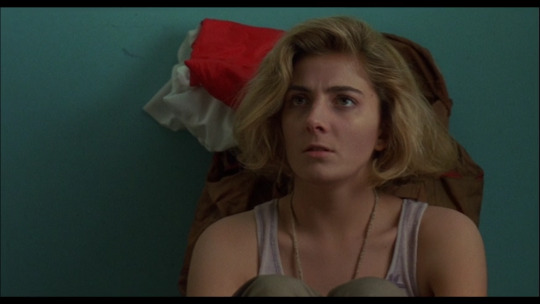

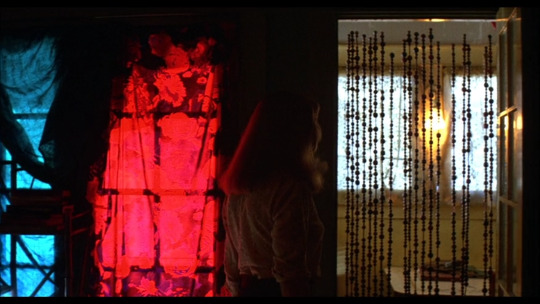
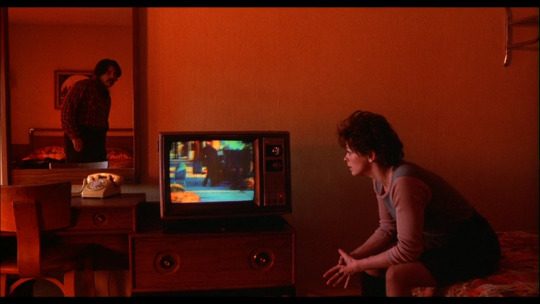
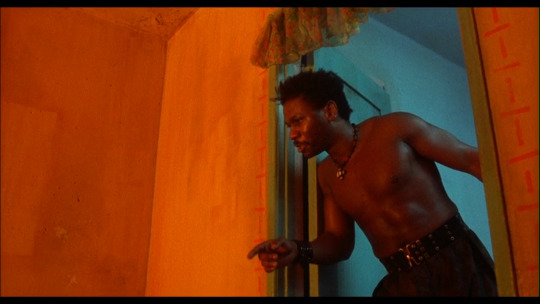
Chroma expressing the psychedelic allure of radical politics in Patty Hearst (1988).
0 notes
Photo
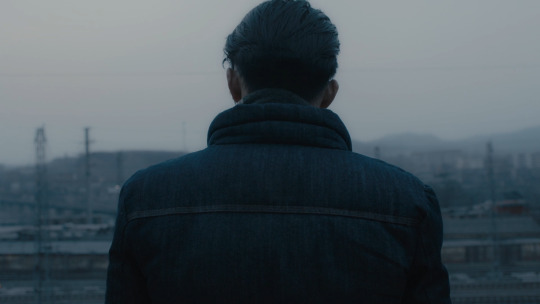

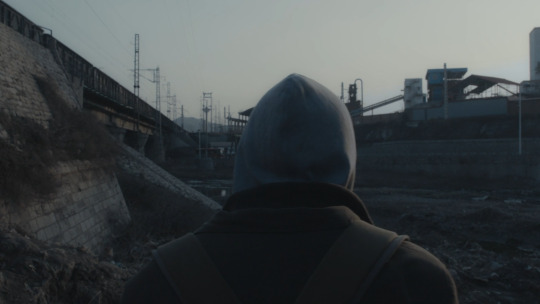
Third person perspective in An Elephant Sitting Still.
2 notes
·
View notes
Photo
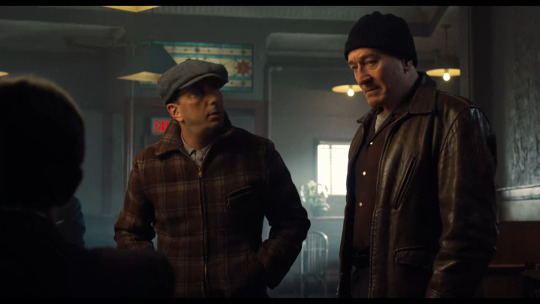
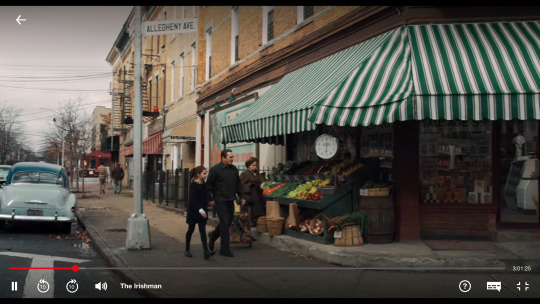




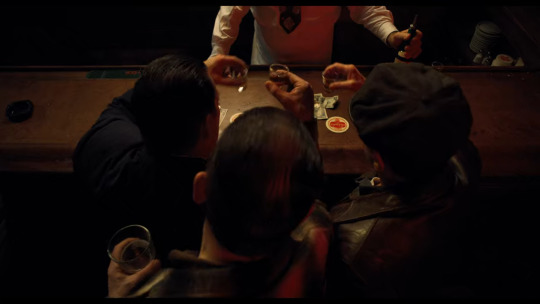
There’s a new cafe in Ridgewood, Queens called Porcelain. The space its in was first converted into a bar for a few early scenes in the Irishman ---> across the street on Woodward and Catapla was the deli set for where the owner gets smashed in the curb. We live (and shot most of PVT CHAT) right around the corner. Who knew?!
0 notes
